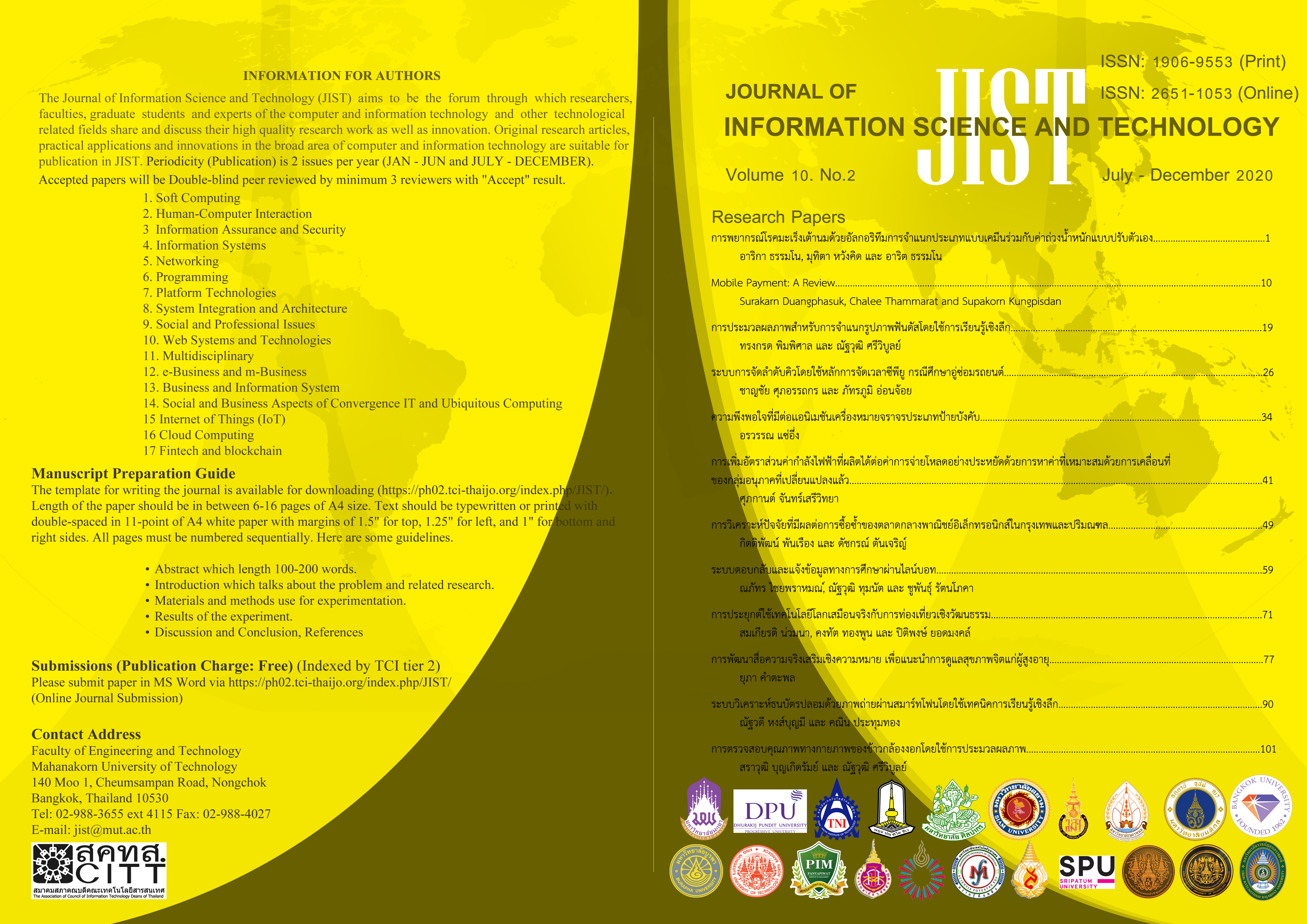Queuing System using CPU Scheduling: A Case Study of a Car Garage
Main Article Content
Abstract
This paper regards a Research and Development (R&D), which involves with a web-based application. The objectives of this research are: 1) to design and develop the queuing system using CPU scheduling: A case study of a car garage; and 2) to examine the users’ satisfaction with the system. The CPU scheduling assists in providing information to service providers in attempts to reduce scheduling conflicts and longer wait-times. There are four algorithms of CPU scheduling. 1) First-Come First-Served scheduling 2) Short-Job-First scheduling 3) Priority scheduling and 4) Optimum scheduling. The results indicated that the users were highly satisfied, the average was 4.46 and standard deviation was 0.64. This system can be an effective and promising alternative to the improvement of the data management system.
Article Details
This work is licensed under a Creative Commons Attribution-NonCommercial-NoDerivatives 4.0 International License.
I/we certify that I/we have participated sufficiently in the intellectual content, conception and design of this work or the analysis and interpretation of the data (when applicable), as well as the writing of the manuscript, to take public responsibility for it and have agreed to have my/our name listed as a contributor. I/we believe the manuscript represents valid work. Neither this manuscript nor one with substantially similar content under my/our authorship has been published or is being considered for publication elsewhere, except as described in the covering letter. I/we certify that all the data collected during the study is presented in this manuscript and no data from the study has been or will be published separately. I/we attest that, if requested by the editors, I/we will provide the data/information or will cooperate fully in obtaining and providing the data/information on which the manuscript is based, for examination by the editors or their assignees. Financial interests, direct or indirect, that exist or may be perceived to exist for individual contributors in connection with the content of this paper have been disclosed in the cover letter. Sources of outside support of the project are named in the cover letter.
I/We hereby transfer(s), assign(s), or otherwise convey(s) all copyright ownership, including any and all rights incidental thereto, exclusively to the Journal, in the event that such work is published by the Journal. The Journal shall own the work, including 1) copyright; 2) the right to grant permission to republish the article in whole or in part, with or without fee; 3) the right to produce preprints or reprints and translate into languages other than English for sale or free distribution; and 4) the right to republish the work in a collection of articles in any other mechanical or electronic format.
We give the rights to the corresponding author to make necessary changes as per the request of the journal, do the rest of the correspondence on our behalf and he/she will act as the guarantor for the manuscript on our behalf.
All persons who have made substantial contributions to the work reported in the manuscript, but who are not contributors, are named in the Acknowledgment and have given me/us their written permission to be named. If I/we do not include an Acknowledgment that means I/we have not received substantial contributions from non-contributors and no contributor has been omitted.
References
Phanit Laosirirat. “Excellence in service improvement with the lean concept of King Chulalongkorn Memorial Hospital,” For Quality Idol&Model, vol. 17, no. 152, pp. 114-119, June 2020.
Attaporn Ketcare, “Bank Service Improvement Using Lean Techniques,” Master of Engineering, Industrial Engineering, Chaing Mai University, 2012.
Abraham Siberchatz, Peter Baer Galvin, and Greg Gangne, Operating System Concepts, Ninth Edition, John Wiley and Sons, INC, pp. 266-271, 2013.
Sindhu M, Rajkamal R, and Vigneshwaran P, “An Optimum Multilevel CPU Scheduling Algorithm,” in Proceedings of the International Conference on Advances in Computer Engineering, Bangalore, India, 2010, pp. 90-94.
M. Gahlawat and P. Sharma, “Analysis and Performance Assessment of CPU Scheduling Algorithms in Cloud using Cloud Sim,” International Journal of Applied Information Systems, vol. 5, no. 9, July, pp. 5-8, 2013.
Neetu Goel, “A Comparative Study of CPU Scheduling Algorithms,” International Journal of Graphics & Image Processing, vol.2, Issue 4, November, pp. 245-251, 2012.



